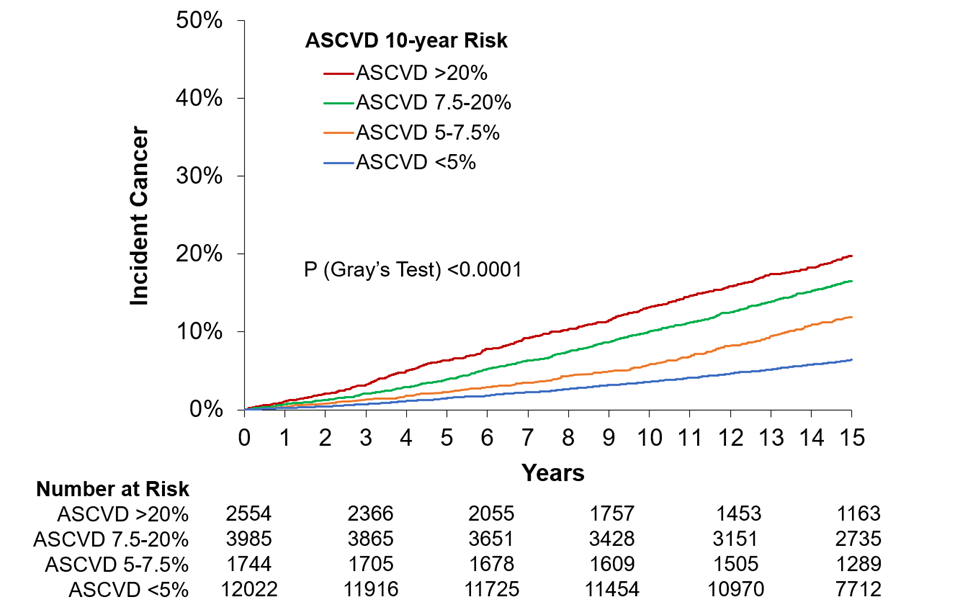Cardiovascular Risk Factors and Future Cancer
Quick Takes
- In a cohort of 20,305 participants from the Framingham Heart Study and PREVEND (Prevention of Renal and Vascular End-Stage Disease) study, traditional cardiovascular disease (CVD) risk factors, 10-year atherosclerotic cardiovascular disease (ASCVD) risk score, and natriuretic peptide concentrations were associated with increased risk of future cancer.
- A heart-healthy lifestyle was associated with lower risk of future cancer.
- Prevalent and interim CVD events were not associated with future cancer.
Study Questions
To what extent are traditional cardiovascular (CV) risk factors, CVD, CVD biomarkers, and ideal CV health metrics associated with future cancer?
Methods
Framingham Heart Study and PREVEND study participants free of cancer at baseline were prospectively followed for development of histologically confirmed cancer. The association of baseline CV risk factors, 10-year ASCVD risk score, established CVD biomarkers, prevalent CVD, interim CVD, and the American Heart Association (AHA) Life's Simple 7 CV health score with incident cancer was evaluated using multivariable Cox proportional hazards regression models, adjusted for age, sex, hypertension treatment, systolic blood pressure, diabetes, body mass index (BMI), total cholesterol/high-density lipoprotein cholesterol ratio, smoking status, and statin use.
Results
Among 20,305 participants (mean age 50 ± 14 years; 54% women), we observed 2,548 cancer cases over a median follow-up of 15 years (quartile 1 to 3: 13.3 to 15.0 years). Compared with participants who did not develop cancer, participants who developed cancer had higher rates of smoking (present and/or former), diabetes, antihypertensive medication use, and hyperlipidemia, as well as higher 10-year ASCVD risk. A similar proportion of interim CVD events was observed among those who did and did not develop cancer.
Of traditional CV risk factors, age, male sex, and smoking status were independently associated with future overall cancer and cancer subtypes (p < 0.006 for all). Specifically, a 1-standard deviation increase in age was associated with greater than twofold increased hazard of incident cancer (hazard ratio [HR] 2.12; 95% confidence interval [CI], 2.00-2.26). BMI was additionally associated with increased risk of gastrointestinal cancer and lower risk of lung cancer. These findings persisted in landmark analyses, where events diagnosed within 1 year of baseline examination were excluded.
CV risk, as captured by 10-year ASCVD risk score, was also associated with increased risk of future overall cancer (HR per 5% increase in ASCVD risk estimate 1.16; 95% CI, 1.14-1.17; p < 0.001), as well as gastrointestinal, lung, prostate, breast, colorectal, hematologic, and bladder cancers.
Among CV biomarkers, natriuretic peptides were significantly associated with future overall cancer (HR 1.26; 95% CI, 1.12-1.41; p < 0.001). By contrast, high-sensitivity troponin was not associated with incident cancer.
Prevalent and interim CVD events were not associated with future cancer.
Finally, optimal CV health, as assessed by the AHA Life's Simple 7 CV Health Score, was associated with decreased risk of future cancer (HR per 1-unit increase in AHA Life's Simple 7 CV health score 0.94; 95% CI, 0.90-0.99; p = 0.01). Individuals with average and optimal CV health were less likely to develop cancer compared with those with poor CV health (p < 0.001).
Conclusions
CV risk, as captured by traditional CV risk factors, estimated 10-year ASCVD risk, and CVD biomarkers, is associated with increased risk of future cancer. A heart healthy lifestyle is associated with lower risk of future cancer.
Perspective
There are conflicting data on the association of CVD with cancer. This study leveraged a large population-based cohort and demonstrated that increased cancer risk persists across different approaches to capturing CV risk, including traditional risk factors, 10-year ASCVD risk, and natriuretic peptide biomarker concentrations. Moreover, there was an inverse relationship between ideal CV health, as measured by AHA Life's Simple 7 CV health score, and cancer risk. These data are in keeping with previous studies including analyses of from the ARIC (Atherosclerosis Risk In Communities) and MESA (Multi-Ethnic Study of Atherosclerosis) studies, both of which supported an association of ideal CV health based on CV risk factors with decreased risk of cancer. This study extends these findings to a larger cohort with rigorously histologically confirmed cancer and suggests that the association between CVD and future cancer may be attributable to shared risk factors, although causality cannot be proven due to the observational nature of the study. With CVD affecting nearly half of US adults, this study highlights the potential value of including cancer risk in conversations about CV risk factor modification and promoting heart-healthy lifestyles.
Figure 1: Risk of Future Cancer by ASCVD Score7
References
- Mozaffarian D, Benjamin EJ, Go AS, et al. Executive Summary: Heart Disease and Stroke Statistics--2016 Update: A Report From the American Heart Association. Circulation 2016;133:447-54.
- Koene RJ, Prizment AE, Blaes A, Konety SH. Shared Risk Factors in Cardiovascular Disease and Cancer. Circulation 2016;133:1104-14.
- Meijers WC, de Boer RA. Common risk factors for heart failure and cancer. Cardiovasc Res 2019;115:844-53.
- Ogunmoroti O, Allen NB, Cushman M, et al. Association Between Life's Simple 7 and Noncardiovascular Disease: The Multi-Ethnic Study of Atherosclerosis. J Am Heart Assoc 2016;5:e003954.
- Narayan V, Thompson EW, Demissei B, Ho JE, Januzzi JL Jr, Ky B. Mechanistic Biomarkers Informative of Both Cancer and Cardiovascular Disease: JACC State-of-the-Art Review. J Am Coll Cardiol 2020;75:2726-37.
- Meijers WC, Maglione M, Bakker SJL, et al. Heart Failure Stimulates Tumor Growth by Circulating Factors. Circulation 2018;138:678-91.
- Lau ES, Paniagua SM, Liu E, et al. Cardiovascular Risk Factors are Associated with Future Cancer. JACC CardioOncol 2021;3:48-58.
Clinical Topics: Cardio-Oncology, Diabetes and Cardiometabolic Disease, Dyslipidemia, Prevention, Lipid Metabolism, Nonstatins, Novel Agents, Statins, Hypertension
Keywords: Cholesterol, HDL, Body Mass Index, Hydroxymethylglutaryl-CoA Reductase Inhibitors, Antihypertensive Agents, American Heart Association, Blood Pressure, Hyperlipidemias, Troponin, Quality Indicators, Health Care, Follow-Up Studies, Confidence Intervals, Urinary Bladder Neoplasms, Diabetes Mellitus, Proportional Hazards Models, Risk Factors, Lung Neoplasms, Biomarkers, Gastrointestinal Neoplasms, Natriuretic Peptides, Cardiovascular Diseases, Hypertension, Colorectal Neoplasms, Reference Standards, Breast Neoplasms, Cardio-oncology, Cardiotoxicity
< Back to Listings

